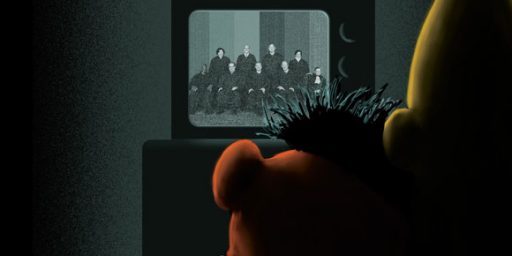Patricia Schroeder, 1940-2023
The trailblazing Congresswoman is gone at 82.

Washington Post (“Patricia Schroeder, congresswoman who wielded barbed wit, dies at 82“):
Former congresswoman Patricia Schroeder, a megaphone for the women’s movement, the first woman to serve on the House Armed Services Committee and a liberal Democrat known for her barbed wit, notably coining the term “Teflon president” to lambaste President Ronald Reagan, died March 13 at a hospital in Celebration, Fla. She was 82.
The cause was complications from a stroke, said her daughter, Jamie Cornish.
Mrs. Schroeder, who grew up in a household where her father assumed women could do anything, earned a pilot’s license at 15, weathered sexism to become a Harvard-trained lawyer and was a 32-year-old mother of two when she was first elected to Congress from Colorado in 1972. “I have a brain and a uterus, and I use them both,” she quipped when one male lawmaker questioned how she could be a wife, mother and congresswoman.
When she arrived in Washington, there were only 14 women in the House, several of whom were widows filling out the terms of their deceased husbands. She described the institution as “an overaged frat house.”
During her 12 terms in the House of Representatives, Mrs. Schroeder was outspoken on issues that ranged from women’s rights and family matters to military policy. She was appointed to the House Armed Services Committee and then fought vigorously to be heard and respected.
F. Edward Hébert of Louisiana, the committee’s hard-line conservative Democratic chairman, allowed just one seat in the hearing room to be shared by Mrs. Schroeder and Ron Dellums, a newly elected African American congressman from California. She recalled Hébert saying, “The two of you are only worth half the normal member.”
Mrs. Schroeder said she and Dellums “sat cheek to cheek on one chair, trying to retain some dignity.”
Hébert was stripped of his chairmanship two years later in a revolt by younger committee members, but before his ouster, Mrs. Schroeder did her best to get under his skin. He returned the favor, refusing to approve her appointment to a U.S. delegation heading to an overseas conference.
“I wouldn’t send you to represent this committee at a dogfight,” Hébert reportedly remarked, according to a Washington Post profile of Mrs. Schroeder. The State Department eventually waived the rule requiring the chairman’s approval of all nominations, and Mrs. Schroeder made the trip.
While often on the losing end of defense debates, Mrs. Schroeder believed that her fight against the Pentagon’s “outrageous” requests helped to create “a political climate conducive to meaningful reform.” A strong proponent of arms control, she derided the Armed Services Committee as a Pentagon “lap dog” and rankled the military brass by constantly questioning their spending habits.
During a 1973 debate over a weapons system, she used mocking language invoking a slick Madison Avenue sales job: “Is it bigger? Is it faster? Is it more maneuverable? Does it give closer, more comfortable shaves?” On another occasion, she chided those who thought that “killing an enemy 15 times over makes us more secure than if we can kill him only five times over.”
On the domestic front, Mrs. Schroeder from 1979 until 1995 co-chaired the Congressional Caucus for Women’s Issues, a bipartisan group of lawmakers devoted to advancing legislation on reproductive rights, women’s equity and workplace flexibility for parents.
She was the primary sponsor of the National Child Protection Act of 1993, which established procedures for national criminal background checks for child-care providers, and she played a pivotal role in the passage of the Violence Against Women Act of 1994, which was intended to help law enforcement and victim services organizations fight rape and other forms of violent crime against women.
Mrs. Schroeder also was a strong advocate for the Breast and Cervical Cancer Mortality Prevention Act of 1990, which provided lower-income women with breast and cervical cancer screening and post-screening diagnostic services in an effort to enhance early detection. The law, however, did not pay for treatment, placing many uninsured women in a predicament of not being able to afford care. A decade later, Congress passed legislation providing medical assistance to eligible uninsured women through Medicaid.
She spent nine years championing the Family and Medical Leave Act, which was approved by Congress in 1993 and provides job protection for up to 12 weeks of unpaid leave for the care of a newborn, sick child or parent. And as chairwoman of a Post Office and Civil Service subcommittee, she was a leading advocate for federal employees in such areas as whistleblower legislation.
New York Times (“Patricia Schroeder, Feminist Trailblazer in Congress, Dies at 82“):
Patricia Schroeder, a trailblazing feminist legislator who helped redefine the role of women in American politics and used her wit to combat egregious sexism in Congress, died on Monday. She was 82.
[…]
Elected in 1972 as an opponent of the Vietnam War, Ms. Schroeder served on the Armed Services Committee for all 24 years she was in Congress. From that perch, she called for arms control and reduced military spending.
She worked to improve benefits for military personnel and persuaded the committee to recommend that women be allowed to fly combat missions; Defense Secretary Les Aspin ordered it so in 1993, and by 1995, the first female fighter pilot was flying in combat. That only further outraged Ms. Schroeder’s critics on the right, like Lt. Col. Oliver North, who called her one of the nation’s 25 most dangerous politicians.
One of the most enduring public images of Ms. Schroeder is of her crying when she announced in 1987 that she would not run for president. At an outdoor event in Denver, she choked up with emotion, pressed a tissue to her eyes, and at one point leaned her head on her husband’s shoulder. The episode outraged some feminists, who said her tears had reinforced stereotypes and set back the cause of women seeking office.
Associated Press (“Former Rep. Pat Schroeder, pioneer for women’s rights, dies“):
Former U.S. Rep. Pat Schroeder, a pioneer for women’s and family rights in Congress, died Monday night. She was 82.
[…]
Schroeder took on the powerful elite with her rapier wit and antics for 24 years, shaking up stodgy government institutions by forcing them to acknowledge that women had a role in government.
Her unorthodox methods cost her important committee posts, but Schroeder said she wasn’t willing to join what she called “the good old boys’ club″ just to score political points. Unafraid of embarrassing her congressional colleagues in public, she became an icon for the feminist movement.
Schroeder was elected to Congress in Colorado in 1972 and became one of its most influential Democrats as she won easy reelection 11 times from her safe district in Denver. Despite her seniority, she was never appointed to head a committee.
Schroeder helped forge several Democratic majorities before deciding in 1997 it was time to leave. Her parting shot in 1998 was a book titled “24 Years of Housework … and the Place is Still a Mess. My Life in Politics,″ which chronicled her frustration with male domination and the slow pace of change in federal institutions.
In 1987, Schroeder tested the waters for the presidency, mounting a fundraising drive after fellow Coloradan Gary Hart pulled out of the race. She announced three months later that she would not run and said her “tears signify compassion, not weakness.” Her heart was not in it, she said, and she thought fundraising was demeaning.
[…]
Republicans were livid after Schroeder and others filed an ethics complaint over House Speaker Newt Gingrich’s televised college lecture series, charging that free cable time he received amounted to an illegal gift under House rules. Gingrich became the first speaker reprimanded by Congress. Gingrich said later he regretted not taking Schroeder and her colleagues more seriously.
Earlier, she had blasted Gingrich for suggesting women shouldn’t serve in combat because they could get infections from being in a ditch for 30 days. According to her official House biography, she once told Pentagon officials that if they were women, they would always be pregnant because they never said “no.″
[…]
It was Schroeder who branded President Ronald Reagan the “Teflon” president for his ability to avoid blame for major policy decisions, and the name stuck.
[…]
Schroeder said legislators spent too much attention on contributors and special interests. When House Republicans gathered on the U.S. Capitol steps to celebrate their first 100 days in power in 1994, she and several aides clambered to the building’s dome and hung a 15-foot red banner reading, “Sold.”
Shroeder has been retired for a quarter century now and I must admit I haven’t given her a lot of thought since. During her career, I didn’t much care for her, seeing her as an extreme partisan and vigorously anti-defense. And, yes, her tears at her announcement she would not run for President are my enduring image of her.
From my current vantage point, her career was rather remarkable. I had no idea the sheer misogyny she had to endure pretty much through the end. Indeed, looking back I’m constantly shocked at how openly misogynistic so much of American pop culture was even in the 1980s.
In hindsight, she was likely right as much as she was wrong on defense issues. And, whatever one thinks of the utility of a given weapons system or nuclear overmatch, the fact that she simultaneously opposed those expenditures and yet fought for better pay and benefits for personnel shows a nuanced approach. And she was certainly proven right on the influence of money on both defense policy and American politics writ large.
Even her emotionalism at her announcement she wouldn’t run for President was ahead of its time. In those days, leaders were expected to be stoic. But politics and campaigning are inherently personal endeavors. Human beings ought to be able to display their emotions in emotional moments.






Here’s Schroeder targeting Newt Gingrich with her rapier wit.
https://twitter.com/HowardMortman/status/1635623167661166592
Kinda funny to compare Schroeder (D-CO) with Boebert (R-CO)
She was one of my childhood heroes. When I was growing up in Colorado she was a frequent topic of conversation at the dinner table.
The world is a better place, or at least a less evil place, thanks to her.
R.I.P.
@James
Yeah, this is a hard thing to get across unless you actually experienced it. I would have had the same notion were it not for my wife. She was one of the first woman to get a job the drafting job shops in Detroit in the early 80’s. the stories she would tell, not just about the misogyny, but the outright abuse she had to put up with.
One story she told me was about an office party where she had to put up with several of her co-workers getting dunk and taking turns playing grab ass. She was pretty vocal about the fact that the attention was unwanted but they were undeterred. She reported the behavior to her direct report and was literally laughed at told that she wasn’t being a “good sport”.
Little did these guys know that her father in law was not only the one of the part owners in the shop but the guy was also very likely “connected” to area wise guys. long story short, one of the guys got fired, the rest had to deliver apologies both in person and in writing. The takeaway here is that if not for her relationship, nothing at all would have been done to these guys. She did enjoy “special protection” after that. No one dared say boo to her, but every single one of the guy held a grudge and that effected her work.
After a year or two she got a job at another job shop and this crap started right up again. Since then I have talked to a number of woman who were part of the uptick in woman in the workplace in the 80’s and hear a lot of the same stories, especially in a traditionally male occupation like drafting. It wasn’t just pop culture, it was something like a war.
Anyway for all the woman out there who had to be the first I tip my hat and raise a glass.
RIP Pat Schroeder.
My home state is Colorado and Shroeder is the only Colorado representative from that era that I really remember, and I didn’t even grow up or live in her district. She was definitely a force to be reckoned with and a pioneer.
Like all politicians, she wasn’t completely consistent on those. As one example, I specifically remember she fought hard to keep Lowry AFB (located in Denver in her district) off the BRAC lists while simultaneously arguing for greatly reduced defense budgets.
@Rick DeMent: Yeah. I remember similar stories from women in non-traditional employment in the late 90s while I was teaching.
In 1977 I spent some quality time with a single mom who was an auto mechanic. The shop she worked at was called Global Auto as their specialty was foreign car repair. I knew all the guys that she worked with.
Never heard much about co-workers giving her grief except one of the owners. But he gave everyone shit.
She always told me about the jobs when she had to light up the torch. Those were the worst.
When we would meet at the tavern after work she would say: “You go sit at the bar. I’m going over to that table over there to sit with my girlfriends and we’re gonna’ quack like ducks.”